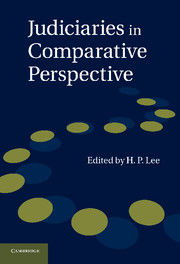Book contents
- Frontmatter
- Contents
- Contributors
- Foreword
- Preface
- Table of cases
- Table of statutes
- Part I
- Part II
- Part III
- 8 Judges’ freedom of speech
- 9 Judges and free speech in Canada
- 10 Judges and free speech in New Zealand
- 11 The judiciary and freedom of speech in South Africa
- 12 Judges and free speech in the United Kingdom
- 13 The criticism and speech of judges in the United States
- Part IV
- Part V
- Part VI
- Index
- References
9 - Judges and free speech in Canada
from Part III
Published online by Cambridge University Press: 07 September 2011
- Frontmatter
- Contents
- Contributors
- Foreword
- Preface
- Table of cases
- Table of statutes
- Part I
- Part II
- Part III
- 8 Judges’ freedom of speech
- 9 Judges and free speech in Canada
- 10 Judges and free speech in New Zealand
- 11 The judiciary and freedom of speech in South Africa
- 12 Judges and free speech in the United Kingdom
- 13 The criticism and speech of judges in the United States
- Part IV
- Part V
- Part VI
- Index
- References
Summary
Canada provides an interesting case study of the interaction of free speech and the judiciary in large part because of the impact of the Canadian Charter of Rights and Freedoms (henceforth ‘the Charter’) on the topic. The Charter was enacted as a constitutional bill of rights in 1982. Subject to demonstrably justified reasonable limits that are prescribed by law, the Charter protects freedom of expression. It also recognises the importance of judicial independence and impartiality by providing a right to a fair and public hearing by an independent and impartial tribunal. In addition, it protects equality rights.
The Charter has had a significant liberating effect on critical speech about the judiciary and on extra-judicial free speech by sitting judges. Today, judges in Canada make extra-judicial speeches on matters of public controversy that would have been unacceptable in the pre-Charter era. Canadian judges can now discuss labour, health, national security and criminal justice policy and the treatment of disadvantaged groups and justifiably claim that they are focusing on issues that relate to the administration of justice.
- Type
- Chapter
- Information
- Judiciaries in Comparative Perspective , pp. 175 - 194Publisher: Cambridge University PressPrint publication year: 2011
References
- 1
- Cited by



